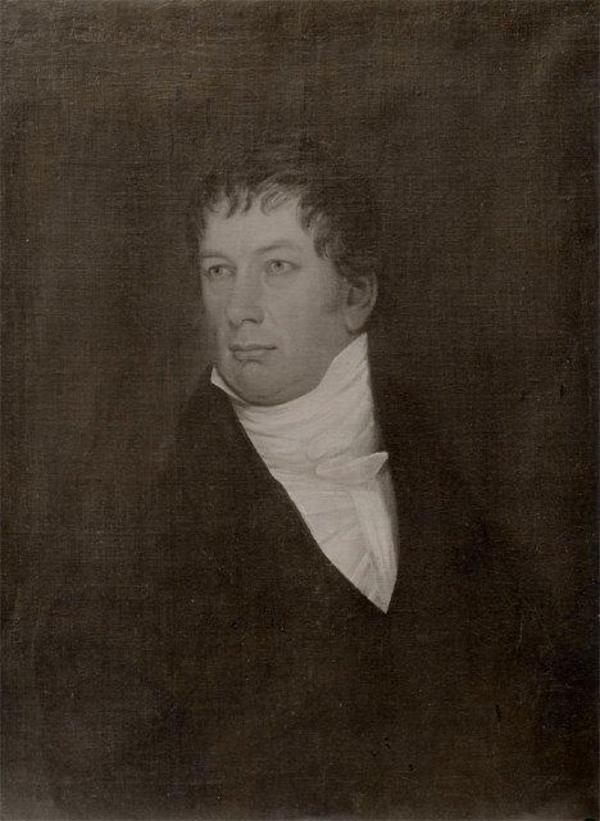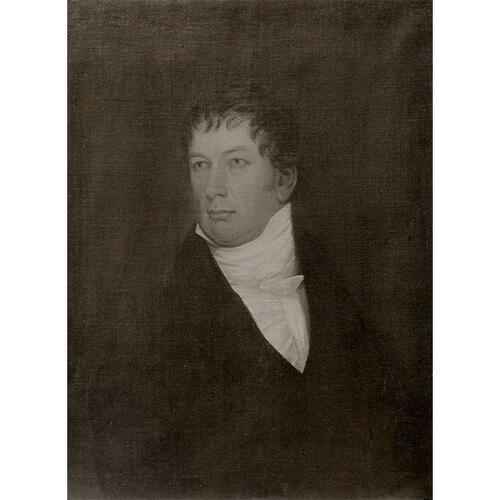
Source: Link
TASCHEREAU, JEAN-THOMAS, office holder, politician, lawyer, businessman, militia officer, seigneur, jp, and judge; b. 26 Nov. 1778 in Sainte-Marie-de-la-Nouvelle-Beauce (Sainte-Marie), Que., son of Gabriel-Elzéar Taschereau* and Marie-Louise-Elizabeth Bazin; d. 14 June 1832 at Quebec.
Jean-Thomas Taschereau was admitted to the Petit Séminaire de Québec in 1789. Because of his intellectual ability he skipped grades with ease and thus completed the course of study in less than six years. In November 1799 his father, who was then grand voyer (chief road commissioner) for the district of Quebec, took him on as his assistant. He studied law with Jonathan Sewell* at the same time and was authorized to practise as a lawyer on 9 Nov. 1801.
Taschereau had been elected for Dorchester to the House of Assembly of Lower Canada on 28 July 1800. During his first term he split his votes between the English party and the Canadian party, but during his second he basically supported only the latter. His defeat at the polls in May 1808 was partly engineered by the political scheming of judge Pierre-Amable De Bonne* and his allies in the English party. The following month the governor, Sir James Henry Craig*, stripped him of his rank as militia captain because he was involved in publishing the newspaper Le Canadien. In the 1809 contest he was elected for Dorchester and Leinster ridings. However, a month after the session opened Craig prorogued the house. Taschereau used the pages of Le Canadien to keep up the fight against the governor’s arbitrary conduct. But the issue of 17 March 1810 was suppressed and the presses and type seized. Pierre-Stanislas Bédard, François Blanchet, and Taschereau, as well as the printer Charles Lefrançois, were arrested for seditious conduct and imprisoned. Taschereau protested to the Executive Council against the vague accusation of treason and demanded a trial. Although he was in prison when elections were held that year, he was nominated in Dorchester riding, where he was beaten by John Caldwell*. He was finally released at the end of June without having been brought before the courts.
War with the United States provided a distraction from the war of ideas in Lower Canada. In April 1812 Taschereau was commissioned major in the Sainte-Marie-de-la-Nouvelle-Beauce battalion of militia and in this capacity he was engaged in the early part of the campaign. On 27 March 1813 he replaced Xavier-Roch Tarieu* de Lanaudière as deputy adjutant general of the Lower Canadian militia.
Taschereau’s duties did not prevent him from serving as a justice of the peace in the district of Quebec from May 1812; nor did they keep him from running in Dorchester riding, where he was elected in August. In the house he brought forward a motion to study ways and means of establishing schools in the rural parishes. The assembly pronounced itself in favour of granting a sum not exceeding £60 to pay a schoolteacher in any parish that asked for one, but the bill never became law. Taschereau did not give up his interest in education, and on 11 March 1814 he became a commissioner for setting up a school in Sainte-Marie-de-la-Nouvelle-Beauce under the aegis of the Royal Institution for the Advancement of Learning [see Joseph-Antoine Philippon].
In June 1815 Taschereau was appointed commissioner for the district of Quebec to carry out the act to improve inland communications within the province. Four years later, with George Waters Allsopp*, Michel-Louis Juchereau* Duchesnay, and Robert Christie*, he became a member of a commission to inquire into title-deeds in the district of Gaspé, settle land-claim disputes, and investigate the needs of the inhabitants of the Gaspé peninsula. The commission held sittings in 1819 and 1820; its first report suggested that agriculture be encouraged, roads be laid out, and the facilities of the port of Gaspé be improved. The commissioners visited the Gaspé in 1819, 1820, and 1823 before their mandate expired in April 1825.
Taschereau had been appointed a justice of the peace for the district of Gaspé on 15 June 1819. In the elections the following year he was defeated in Dorchester by a newcomer, lawyer Louis Lagueux, but was elected in Gaspé riding. In 1821 he was appointed to serve on the Commissioners Court, a body authorized to hear small causes, in Sainte-Marie-de-la-Nouvelle-Beauce. On 6 June of that year he obtained a similar post on the Quebec Court of General Sessions. A few days later his commission as justice of the peace for the district of Quebec was renewed. In July and October of the same year he also received similar commissions for the districts of Montreal and Saint-François; he became a justice of the peace for the district of Gaspé in 1824, and for Trois-Rivières in 1828.
Taschereau was made a king’s counsel on 9 Oct. 1821. The following year he became a member of the board of directors of the Royal Institution for the Advancement of Learning. In 1825 he received a commission to hear and judge criminal cases. Two years later he replaced his brother-in-law, Olivier Perrault, as judge of the Court of King’s Bench for the district of Quebec. He held this office until he was appointed to the Legislative Council in May 1828.
Even before his father’s death in 1809 Taschereau had prepared to take advantage of the division of the paternal seigneurial domain by beginning to build a huge manor-house, and he had encouraged the establishment of light industry in Sainte-Marie-de-la-Nouvelle-Beauce. In 1808, in partnership with his brother Thomas-Pierre-Joseph he had a distillery built. When his father died he inherited a part of the estate. He set up a potash factory in 1813, and a tannery and sawmill the following year. In 1820 Taschereau began work on a grist-mill with two sets of grinding machinery. With a brickyard already in place, Sainte-Marie-de-la-Nouvelle-Beauce had become a real industrial centre. Since he was detained at Quebec by his numerous duties, Taschereau from 1814 entrusted the management of his properties to Alexander Miller.
Taschereau caught cholera while attending the burial of a friend who had succumbed in the epidemic at Quebec. He died on 14 June 1832 and was buried there the same day. On 19 May 1806 he had married Marie Panet, daughter of Jean-Antoine Panet*, at Quebec. They had had seven children, six of whom reached adulthood: Marie-Louise and Élisabeth-Suzanne, who married respectively Randolph Isham Routh* and Elzéar-Henri Juchereau* Duchesnay; Jean-Thomas*; Claire-Caroline; Elzéar-Alexandre*; and Agnès. Mme Taschereau lived at Sainte-Marie-de-la-Nouvelle-Beauce until her death on 14 Sept. 1866.
Jean-Thomas Taschereau is the author of Procédés d’un comité spécial, nommé mercredi, le 15e janvier, 1823, sur le bill pour mieux régler les pêches dans le district inférieur de Gaspé, avec une instruction de considérer, s’il n’est pas expédient d’étendre les dispositions du dit bill aux comtés de Cornwallis et Northumberland (Québec, 1823).
ANQ-Q, CE1-1, 19 mai 1806, 14 juin 1832; CN1-178, 19 août 1813; CN1-230, 24, 29 nov. 1810; 1er , 22 mars 1811; ZQ6-45, 26 nov. 1778. ASQ, Fichier des anciens. Docs. relating to constitutional hist., 1791–1818 (Doughty and McArthur), 427. F.-J. Audet, “Les législateurs du Bas-Canada.” Officers of British forces in Canada (Irving). “Papiers d’Etat – Bas-Canada,” PAC Rapport, 1893: 12, 19, 39. Turcotte, Le Conseil législatif, 103–5. Provost, Sainte-Marie; hist. civile; Sainte-Marie; hist. religieuse. J E. Roy, Hist. de Lauzon, 3: 381–96; 5: 254–60. P G. Roy, La famille Panet (Lévis, Qué., 1906); La famille Taschereau (Lévis, 1901).
Cite This Article
Honorius Provost, “TASCHEREAU, JEAN-THOMAS (1778-1832),” in Dictionary of Canadian Biography, vol. 6, University of Toronto/Université Laval, 2003–, accessed April 1, 2025, https://www.biographi.ca/en/bio/taschereau_jean_thomas_1778_1832_6E.html.
The citation above shows the format for footnotes and endnotes according to the Chicago manual of style (16th edition). Information to be used in other citation formats:
| Permalink: | https://www.biographi.ca/en/bio/taschereau_jean_thomas_1778_1832_6E.html |
| Author of Article: | Honorius Provost |
| Title of Article: | TASCHEREAU, JEAN-THOMAS (1778-1832) |
| Publication Name: | Dictionary of Canadian Biography, vol. 6 |
| Publisher: | University of Toronto/Université Laval |
| Year of revision: | 1987 |
| Access Date: | April 1, 2025 |



